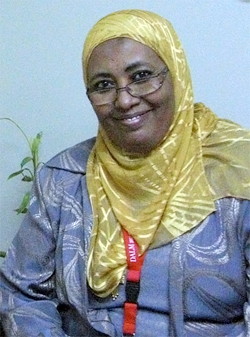Liaison between medical and cultural teams at WCMC-Q leads to effective treatment and safe return of ‘missing’ businessman

Director of CCCHC, Maha Elnashar, with student Rana Emam -
Third Year Medical Student
The quick thinking of a Weill Cornell Medical Student in Qatar and the services of our Cultural Competency team, helped ease the distress of a confused and lost foreign national on transit through Qatar. The Italian businessman was travelling from Venice to the Philippines via Doha when he was taken ill and admitted to Hamad Hospital via the Emergency department. When he didn’t arrive at his destination, he was reported as missing to the Italian embassy in Qatar. However, thanks to WCMC-Q, and a coincidental phone call, he has now been reunited with his family.
The man appeared to be inebriated, he also appeared to be resistant to treatment and uncooperative with the medical staff. Having once blacked out, he was kept in hospital overnight and, despite the doctors being unable to communicate with him, they continued to try to administer treatment.
When Rana Emam, a third year medical student at WCMC-Q, came on duty she suspected that this man’s problems might be greatly eased if a translator was found. She contacted the university’s Centre for Cultural Competence in Health Care, (CCCHC), which was set up to the bridge the gap in understanding among the diverse cultures found in Qatar when delivering healthcare.
Emam said, "It is important to consider all factors involved in a patient’s wellbeing when they are admitted to hospital. It was possible that all this man’s problems were down to an excessive intake of alcohol, but without being able to clearly understand him, we wouldn’t know if other factors might also be attributed to his symptoms and behaviour. That is why I thought of contacting CCCHC to see if they could help."
Huda Abdelrahim, a medical interpreter with the CCCHC, received the call from Emam and initiated a search for an Italian interpreter. Through a diverse network of professional contacts, she was able to locate Dr. Ahmed Kahlout, an Italian-speaking Arabic doctor from another medical facility, who was able to help.
Once Dr. Kahlout arrived at the hospital and began to communicate with the distressed businessman, he became far more cooperative and it was established that he was not refusing treatment after all. Huda said, "Through the interpreter the medical teams were able to take a proper medical history and it was further established that his ‘blackout’ was not necessarily caused through excessive drinking, but that he had a history of epilepsy.
“He was obviously very anxious and confused. He couldn’t communicate with the doctors, he was missing his family, as well as his connecting flight, and all these distressing factors contributed to what appeared to be resistant behaviour. However, through the collaboration between our student doctor, together with the medical staff at HMC and the interpreter, we were able to alleviate his distress.”

Huda Abdelrahim - Medical Interpreter, WCMC-Q
At this stage, the Italian patient had been hospitalized for over a day and his connecting flight had continued on to Manila where his wife was expecting to see him. Naturally she was concerned and contacted his family in Venice. They raised the alarm and reported him as missing.
Fortunately for the patient, Dr. Kahlout contacted his own wife to let her know that he was working at the hospital and that he might be late home. Coincidently, she works at the Italian embassy. "When I remarked that I was about to help translate for an Italian businessman who found himself in hospital whilst en-route to Manila, she became very excited and told me the embassy was looking for just such a man."
Representatives from the embassy visited him in hospital and were able to let his family know he was safe and well. Having been given appropriate treatment, the patient was able to speak to his family and reassure them he would be seeing them soon. He has since completed his journey on to Manila.
Maha Elnashar, the Director of CCCHC said, "We are very proud of Rana for being proactive. CCCHC guides students to be proactive in eliminating any barriers that may affect the quality of health-care. These barriers can be language or cultural barriers. We also train students to be able to acknowledge and respond to the patient’s culture in its broadest dynamic sense, taking into account issues such as traditional beliefs and socio-economical factors."
A spokesman for Hamad Medical Corporation said, "Our relationship with Weill Cornell is well established and highly valued on a number of fronts. This heart-warming story is a great practical demonstration of how partnership working can really add value."
